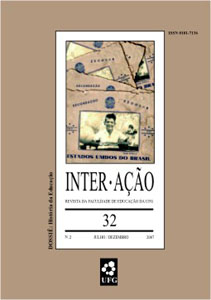O DIREITO DE SER EM EDUCAÇÃO: UM OLHAR SOBRE AS DIFERENÇAS E SOBRE A HISTÓRIA DA LEGISLAÇÃO
DOI:
https://doi.org/10.5216/ia.v32i2.3065Abstract
Este artigo focaliza as relações que definem as políticas inclusiva e a complexidade que caracteriza esse processo ao longo da história da educação. O direito ao ensino regular tem possibilitado às crianças com necessidades educativas especiais a busca de qualificação em várias áreas do conhecimento, desenvolvendo funções sociais e cognitivas. Neste artigo, atenção especial é dada à teoria de Vygotsky e suas implicações para o debate sobre inclusão nos campos da arte e educação na escola e na sociedade. O artigo focaliza também as relações que definem a política inclusiva e a complexidade que caracteriza esse processo. Questiona-se ainda o belo, os valores e padrões preestabelecidos, os critérios de avaliação e a discriminação que prejudicam o desenvolvimento e a aprendizagem das habilidades e a independência dessas crianças.Downloads
Downloads
Published
How to Cite
Issue
Section
License
Inter-Ação uses the Creative Commons Attribution 4.0 License for Open Access Journals (Open Archives Initiative - OAI) as the basis for the transfer of rights. Open access means making documents available on the Internet free of charge, so that users can read, download, copy, distribute, print, search, or link to the full text of documents, process them for indexing, use them as input data for software programs, or use them for any other lawful purpose, without financial, legal, or technical barriers.
Authors publishing in this journal agree to the following conditions:
1) Authors retain copyright and grant the journal the right of first publication, with the work simultaneously licensed under the Creative Commons Attribution License, which permits redistribution of the work with attribution and first publication in this journal.
2) Authors are permitted to enter into additional, separate agreements for non-exclusive distribution of the version of the work published in this journal (e.g., for publication in an institutional repository or as a book chapter), with attribution and first publication in this journal.
3) Authors are permitted and encouraged to publish and distribute their work online (e.g. in institutional repositories or on their home page) at any time before or during the editorial process, as this may generate productive changes as well as increase the impact and citation of the published work.















